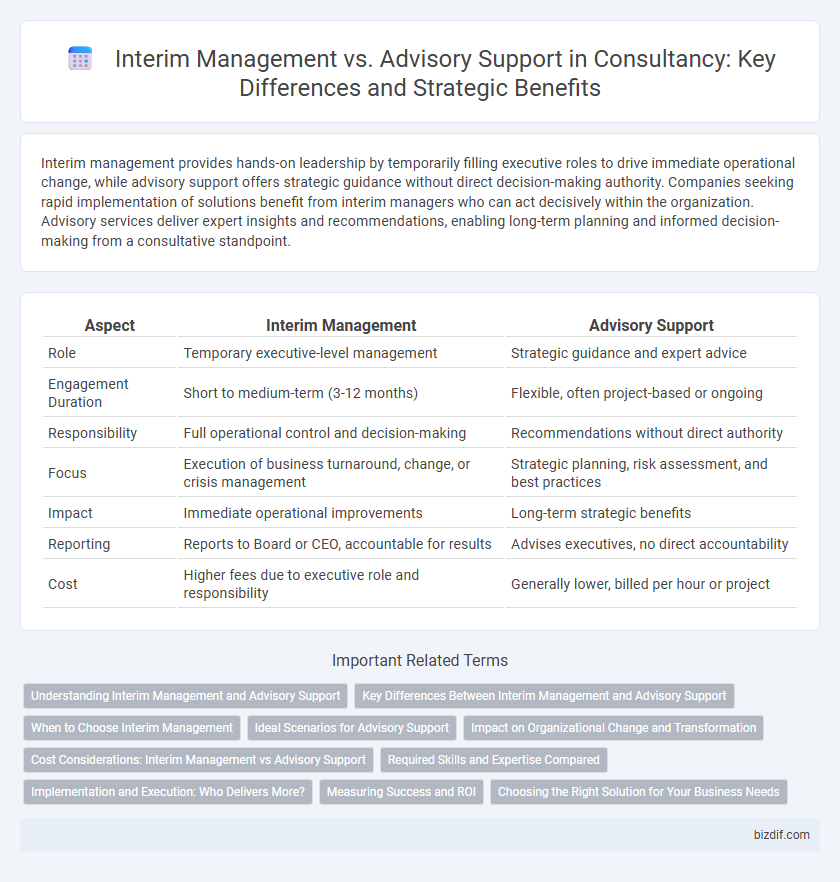Interim management provides hands-on leadership by temporarily filling executive roles to drive immediate operational change, while advisory support offers strategic guidance without direct decision-making authority. Companies seeking rapid implementation of solutions benefit from interim managers who can act decisively within the organization. Advisory services deliver expert insights and recommendations, enabling long-term planning and informed decision-making from a consultative standpoint.
Table of Comparison
| Aspect | Interim Management | Advisory Support |
|---|---|---|
| Role | Temporary executive-level management | Strategic guidance and expert advice |
| Engagement Duration | Short to medium-term (3-12 months) | Flexible, often project-based or ongoing |
| Responsibility | Full operational control and decision-making | Recommendations without direct authority |
| Focus | Execution of business turnaround, change, or crisis management | Strategic planning, risk assessment, and best practices |
| Impact | Immediate operational improvements | Long-term strategic benefits |
| Reporting | Reports to Board or CEO, accountable for results | Advises executives, no direct accountability |
| Cost | Higher fees due to executive role and responsibility | Generally lower, billed per hour or project |
Understanding Interim Management and Advisory Support
Interim management involves placing experienced executives within an organization for a limited period to lead specific projects, solve critical issues, or drive transformational change directly. Advisory support, by contrast, offers expert guidance and strategic recommendations without assuming direct operational control, enabling organizations to benefit from specialized knowledge while retaining decision-making authority. Understanding the distinct roles helps businesses choose the optimal approach to address immediate challenges or long-term strategic needs effectively.
Key Differences Between Interim Management and Advisory Support
Interim management involves integrating experienced executives directly into an organization to lead projects or manage transitions with hands-on decision-making authority, while advisory support provides expert recommendations without direct operational control. Interim managers drive immediate changes and are accountable for results, whereas advisors offer strategic guidance and insights to influence long-term planning. The key distinction lies in execution responsibility for interim managers versus consultative roles for advisors.
When to Choose Interim Management
Interim management is ideal when a company requires immediate leadership to navigate critical transitions, such as mergers, restructuring, or sudden executive vacancies. This hands-on approach delivers operational control and decisive action, whereas advisory support primarily offers strategic guidance without direct management. Choose interim management to ensure seamless continuity and maintain performance during periods of significant change.
Ideal Scenarios for Advisory Support
Advisory support is ideal for organizations seeking strategic guidance without immediate operational control, particularly during phases of transformation, innovation, or complex decision-making. Companies facing market expansion, digital transformation, or regulatory changes benefit from expert insights to shape long-term strategies and risk management. Advisory services provide tailored recommendations, enabling leadership to make informed decisions while maintaining full authority over implementation.
Impact on Organizational Change and Transformation
Interim management drives organizational change by embedding experienced leaders who make decisive, hands-on decisions accelerating transformation initiatives. Advisory support provides strategic insights and expert recommendations, influencing change indirectly through guidance without direct operational control. The impact on organizational transformation is more immediate and measurable with interim management, whereas advisory support fosters long-term development through informed decision-making frameworks.
Cost Considerations: Interim Management vs Advisory Support
Interim management typically incurs higher direct costs due to the full-time presence and immediate accountability of the manager within the organization. Advisory support often offers a more cost-effective solution by providing expert guidance on a part-time or project basis without the overhead of a permanent role. Organizations must weigh the value of hands-on operational control against the budget-friendly nature of consultancy advice when deciding between these options.
Required Skills and Expertise Compared
Interim management demands hands-on leadership skills and operational expertise to drive immediate business results during transition periods. Advisory support requires deep analytical abilities and strategic insight to provide informed recommendations without direct execution responsibility. Both roles benefit from industry-specific knowledge, but interim managers must excel in change management, while advisors focus on problem-solving and decision-making advisory.
Implementation and Execution: Who Delivers More?
Interim management provides hands-on leadership by embedding experienced executives directly into organizations to drive implementation and execution of strategic initiatives, ensuring real-time decision-making and accountability. Advisory support offers expert recommendations and strategic guidance but typically lacks direct involvement in day-to-day operations, limiting influence over execution outcomes. Organizations requiring immediate operational control and tangible progress benefit more from interim management, while advisory support suits scenarios focused on planning and analysis.
Measuring Success and ROI
Interim management delivers measurable success through direct accountability and rapid implementation of strategic initiatives, often resulting in immediate ROI improvements by filling leadership gaps. Advisory support enhances decision-making with expert insights and recommendations, which require effective follow-up and execution to translate into tangible ROI. Measuring success for interim management relies on performance metrics and project milestones, while advisory support success depends on the quality of advice adoption and long-term impact on business outcomes.
Choosing the Right Solution for Your Business Needs
Interim management provides hands-on leadership by placing experienced executives temporarily within your organization to drive change or manage transitions effectively. Advisory support delivers strategic insights and recommendations without direct involvement in day-to-day operations, ideal for businesses seeking expert guidance while maintaining internal control. Selecting the right solution depends on your immediate operational demands and long-term strategic goals, ensuring alignment with business scale, urgency, and resource availability.
Interim management vs Advisory support Infographic

 bizdif.com
bizdif.com